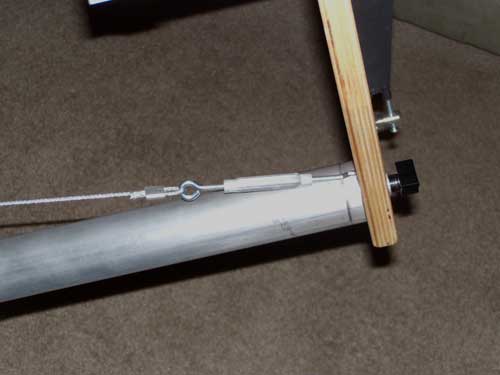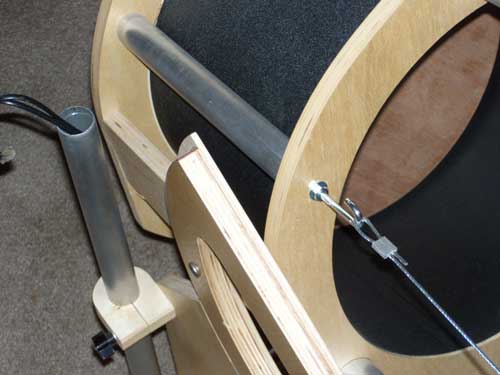|
|
|
|
String and Strut Telescopes DISCUSSION: String telescopes are an interesting and innovative design that introduces a "triangular" configuration to the parallel strut telescope. It is, in essence, a "virtual truss" telescope and adds rigidity to the parallel strut (for a discussion of flex and rigidity, click here). The parallel strut telescope has a number of advantages over the traditional truss telescope. The open construction is lighter and is easier to store and move. Some issues, such as the control of dew on the primary or the possible use of a light shroud are easy to address. But, since the truss telescope is an inherently rigid design, being able to implement a "virtual truss" element, if needed, is a worthwhile endeavor. A string telescope uses parallel struts with the addition of complementary tension "strings" which changes the geometry to a "virtual" truss. A truss is a triangle and the triangle is inherently rigid, so the result is completely stable optical tube assembly -- but with all the benefits of the ultra-lite design. Even though the telescopes moves in two axis -- azimuth and altitude -- only the altitude axis is affected by the effects of flex (at least that's the case with my telescope).
|
|
 |
My
implementation of the "string telescope variant" is
pretty simple to implement. A "hook" at the top of the mirror box and
a turn-buckle at the upper ring completes the string
configuration. I hook the turn-buckle over the top of the
strut itself. A small hole is drilled in the underside of the
top ring for clearance, but does not go all the
way through the wood. I use 3/16" aircraft cable for the "string". In order to get the tension about the same on each side, I "pluck" the cable like a guitar!! When they sound the same, the tension is about the same (since the strings are the same length). |
 |
Here's a picture of the top
ring and turn-buckle. What's the result of this effort? The virtual truss design works perfectly, completely removing any evidence of flex from the optical system. The telescope here is a 13.1" F4.5. |
 |
Here's a picture of the "hook" at the top of the mirror box. The parallel strut telescope is an elegant alternative to the traditional truss telescope. It's lighter, easier to manage, easier to set-up and store. These telescopes will usually fit into the trunk of a small car and will be ready to use in a matter of just a few minutes. And, yes, they hold collimation well. Using "strings", when needed, is a great way to introduce rigidity into the parallel strut system, especially when the telescope has a focal ratio greater than F5. |
 |
Here's an interesting
solution from Jon in San Diego. After assembling one of my
kits, Jon found that adding threaded rod, in a truss
configuration, improved his telescope for him. In this design, Jon uses 1/4" threaded rod, a "eye bolt" in the top of the mirror box and a turn buckle. He uses an "eye" bolt through the top ring. It looks like Jon is using a "string" on three sides. |
Here's a couple of websites I found that address the subject of "string telescopes": 1) A 28" String
Telescope. As always, I invite your comments, additions and corrections. If you've found this discussion valuable, please feel free to let me know. Thanks, Dennis |
|
For more information about
your requirements: |
|
|
Copyright © 2007-2013-- DobSTUFF.COM. All rights reserved |
|
